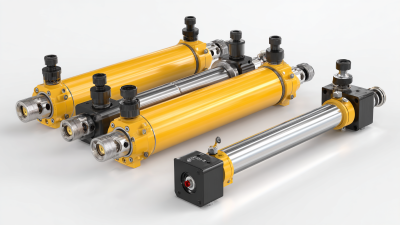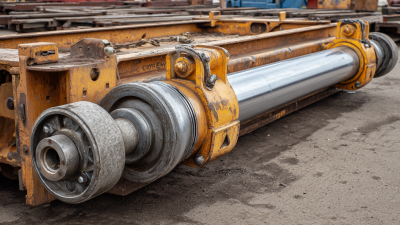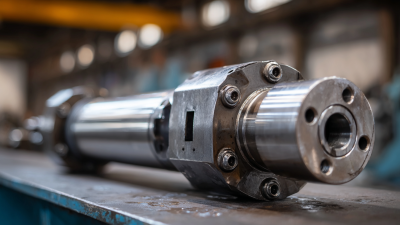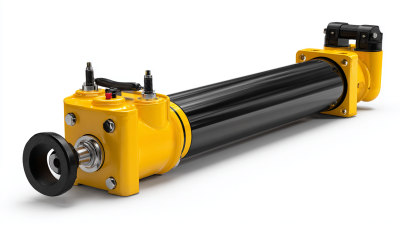
Hydraulic Cylinder For Trailer Common Issues Impacting Performance and Longevity
The hydraulic cylinder for trailers plays a crucial role in the functionality and efficiency of towing operations, significantly impacting performance and longevity. According to a report by the National Trailer Manufacturers Association, approximately 60% of trailer-related issues stem from hydraulic component malfunctions, underscoring the necessity for regular maintenance and understanding of common problems.

Hydraulic cylinders are subjected to immense pressure and frequent cycling, leading to wear and tear that can compromise both their effectiveness and lifespan. Studies have shown that timely identification and resolution of issues can enhance operational efficiency by up to 30%, making it vital for trailer owners and operators to be well-versed in the characteristics and benefits of hydraulic cylinders.
This blog will delve into the common issues affecting these vital components and how to mitigate them, ensuring not only optimal performance but also a longer service life for hydraulic cylinders in trailers.
Common Hydraulic Cylinder Issues Affecting Trailer Performance
Hydraulic cylinders play a crucial role in the performance of trailers, but they are not without their common issues. One significant problem is the presence of air in the hydraulic system, often caused by leaks or improper fluid levels. Air bubbles can lead to erratic cylinder movement, resulting in decreased control and efficiency when maneuvering the trailer. Ensuring that the hydraulic system is properly bled and maintained can mitigate this issue, allowing for smoother operation and better responsiveness.
Another frequent issue is wear and tear on seals and gaskets, which can lead to hydraulic fluid leaks. Over time, exposure to extreme temperatures and contaminants can degrade these components, impacting the cylinder's ability to maintain pressure. Regular inspections and timely replacements of these parts are essential for prolonging the life of hydraulic cylinders. By addressing these issues proactively, trailer owners can ensure that their hydraulic systems operate reliably, thus enhancing overall towing performance and safety.
Understanding the Importance of Regular Maintenance for Hydraulic Cylinders
Regular maintenance of hydraulic cylinders is crucial for ensuring their optimal performance and longevity, especially in trailer applications where reliability is key. Neglecting routine checks can lead to several common issues, such as leaks, reduced lifting capacity, and diminished responsiveness. By routinely inspecting for wear and tear, operators can identify potential problems before they escalate, thus preventing costly repairs and unforeseen downtime.
One essential aspect of maintenance involves checking the hydraulic fluid levels and quality. Contaminated or insufficient fluid can affect the hydraulic system's efficiency and may cause premature failure of the cylinders. Additionally, keeping the cylinders clean and free from dirt and debris can greatly reduce the risk of damage and enhance overall functionality. Regular lubrication of moving parts also plays a vital role in ensuring smooth operation and reducing friction, which can wear out seals and other components over time. By prioritizing these maintenance practices, trailer operators can significantly extend the lifespan of their hydraulic cylinders and maintain their performance.
Hydraulic Cylinder Performance Issues
Signs of Wear and Tear in Hydraulic Cylinders You Shouldn't Ignore
When it comes to hydraulic cylinders in trailers, recognizing signs of wear and tear is crucial for maintaining performance and extending their lifespan. One of the most common indicators of deterioration is the presence of oil leaks. If you notice fluid pooling under your trailer or around the hydraulic components, it’s a clear signal that seals or O-rings may have degraded. Addressing these leaks promptly can prevent further damage and costly repairs.
Another sign to watch for is unusual noises during operation, such as grinding or rattling sounds. These noises often indicate internal wear or misalignment within the cylinder. Ignoring these symptoms can lead to catastrophic failures, causing significant downtime. Additionally, if you experience reduced lifting capacity or slower actuation times, it's a strong indication that the hydraulic cylinder may need servicing or replacement. Regular inspections and maintenance can help detect these issues early, ensuring that your hydraulic system remains in peak condition.
Hydraulic Cylinder For Trailer Common Issues Impacting Performance and Longevity - Signs of Wear and Tear in Hydraulic Cylinders You Shouldn't Ignore
| Issue | Symptoms | Causes | Recommended Action |
|---|---|---|---|
| Leaking Seals | Hydraulic fluid around the cylinder | Worn or damaged seals | Replace seals and check for contaminants |
| Pitting on Rod | Visible imperfections on the rod surface | Corrosion or contamination | Re-polish or replace the rod |
| Slow Operation | Cylinder moves sluggishly or hesitates | Contaminated oil or air in the system | Check fluid levels and quality, bleed air |
| Uneven Movement | Cylinder extends or retracts unevenly | Misalignment or internal damage | Inspect for alignment issues and internal wear |
| Overheating | Cylinder or fluid feels excessively hot | Excessive load or poor fluid quality | Reduce load and replace heating oil |
Tips for Preventing Hydraulic Cylinder Failures on Your Trailer
Hydraulic cylinders play a pivotal role in ensuring the smooth operation of trailers, but several common issues can impact their performance and longevity. To maximize the lifespan of these vital components, regular maintenance is crucial. Checking for signs of leaks, ensuring proper fluid levels, and inspecting seals can help prevent unexpected failures. It's also vital to monitor the alignment and mounting of the hydraulic cylinders, as improper installation can lead to undue stress and eventual breakdown.
In addition to regular checks, proactive measures such as using high-quality hydraulic fluid and maintaining suitable operating temperatures can further extend the life of hydraulic cylinders. Addressing minor issues promptly will help avoid costly repairs down the line. This is similar to the way mechanical systems must be entrusted to routine care to avoid serious failures; a small leak or degradation in performance today could signal a larger problem tomorrow. Proper maintenance can save time and significant expenses, ensuring your trailer remains a reliable workhorse for years to come.

How to Choose High-Quality Hydraulic Cylinders for Enhanced Longevity
 When selecting hydraulic cylinders for trailers, quality should be your top priority. High-quality hydraulic cylinders are essential not only for optimal performance but also for enhancing the longevity of your trailer. Look for cylinders made from durable materials such as high-strength steel or corrosion-resistant alloys. These materials can withstand harsh environmental conditions and heavy loads, thus minimizing wear and tear over time.
When selecting hydraulic cylinders for trailers, quality should be your top priority. High-quality hydraulic cylinders are essential not only for optimal performance but also for enhancing the longevity of your trailer. Look for cylinders made from durable materials such as high-strength steel or corrosion-resistant alloys. These materials can withstand harsh environmental conditions and heavy loads, thus minimizing wear and tear over time.
Additionally, pay attention to the manufacturer’s reputation. Established brands often provide detailed specifications and performance ratings, which can help you gauge the reliability of their products. Opt for cylinders that come with a warranty, as this suggests confidence in the quality. Enhanced sealing mechanisms are also crucial; they prevent fluid leakage and keep contaminants out, ensuring smooth operation in the long run. Investing in high-quality hydraulic cylinders may have a higher upfront cost, but the savings from reduced maintenance and longer lifespan make it a smart choice for trailer owners.
Related Posts
-

Top Strategies for Enhancing Performance of Hydraulic Oil Cylinders
-

Understanding the Best Hydraulic Oil Cylinder Types for Your Needs
-

A Comprehensive Guide to Selecting the Best Hydraulic Cylinder for Your Trailer Needs
-

Ultimate Guide to Choosing the Best Hydraulic Oil Cylinder for Your Needs
-

Ultimate Checklist for Choosing the Right Hydraulic Cylinder for Your Forklift
-

Ultimate Guide to Mastering Telescopic Cylinders Underbody for Enhanced Performance
